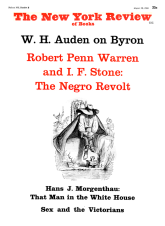In response to:
A Portrait of Gertrude Stein from the July 7, 1966 issue
To the Editors:
Certainly Mr. Virgil Thomson is entitled to his erroneous notions about Jewish forgiveness and the Day of Atonement stated at the close of “A Portrait of Gertrude Stein” [NYR, July 7] but his opinion should not go uncorrected in your journal. Mr. Thomson’s generalization that Jews do not forgive is patently absurd. Furthermore, the Mishnaic tractate Yoma (8:9) states:
For transgressions that are between man and God the Day of Atonement effects atonement, but for transgressions between a man and his fellow the Day of Atonement effects atonement only if he has appeased his fellow [emphasismine].
Clearly, the Christian doctrine of seeking forgiveness from one’s fellow has its parallel in Jewish law.
Gertrude Stein’s statement, reported by Mr. Thomson, that “when a Jewdies he’s dead,” and Alice Toklas’s supporting remarks are also theologically incorrect. The Pharisees, who were responsible for the creation of the Mishnah, also developed the belief in the hereafter (Olam HaBa) into a cardinal doctrine of Judaism, having both individual and national application, as a “necessary corollary to the idea of God’s justice and the assurance of his faithfulness in fulfilling his promises to the righteous” (G. F. Moore, Judaism, II, 319). More than 1800 years later, Judaism still holds the belief in the hereafter to be a central article of faith.
Norman R. Patz
Chaplain, USNR
Norfolk, Virginia
Virgil Thomson replies:
Regarding Marcel Duchamp’s Nude Descending, had I referred to Futurism I should merely have classified one of its origins and failed to describe. Vorticism, on the other hand, though historically the name of a later movement, does evoke the picture’s whirlpool dynamics. So with a small v I used that term, then tried the sentence out on a merchant of historic art, a critic, and two knowledgeable painters, all of whom approved.
Mr. Rose’s kind correction, though technically right, may be, I feel, a shade legalistic. For Duchamp, while no progeny of Wyndham Lewis, is surely one of Vorticism’s uncles, whose work bears some connection to the name.
Chaplain Patz is over-generous in finding me “entitled to my erroneous notions” regarding Jewish faith and morals. When I am wrong, correction is most welcome.
On “transgressions between a man and his fellow” (I should have prefered “by a man against his fellow”) Lt. Patz avers that the Day of Atonement “effects atonement,” but only “if he has appeased his fellow.” I am a little shocked that (unless there is some mistranslation here) mere appeasement rather than full restitution should be considered the aim of penance. However, the fact that something practical is required at all is the major point. For indeed, in the Judeo-Christian world we all inhabit, repairing injustice is everybody’s chore.
As for survival of the individual soul or consciousness after physical death, I have never known a Jew who counted on it. Many Christians too have lost that faith. But if Gertrude Stein, brought up in Jewish practices, did not even know that immortality was “a central article of faith,” save possibly in its national application, I suspect the point may be one very little pressed in home and temple.
This Issue
August 18, 1966



